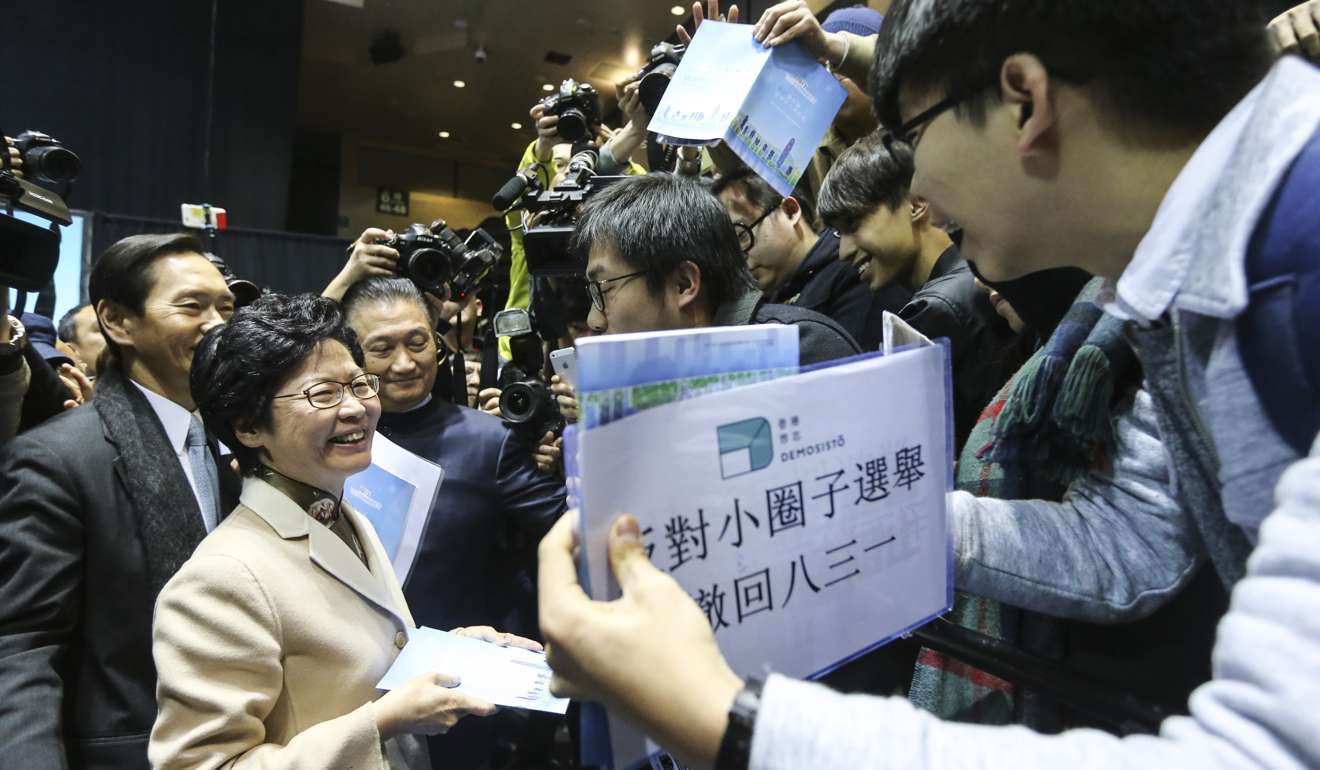
Hong Kong leadership hopeful Carrie Lam confident of winning votes from pan-democratic camp
Former chief secretary also unruffled by prospect of a small margin of victory in March 26 election
Carrie Lam Cheng Yuet-ngor, the only candidate in Hong Kong’s leadership race without any support from pan-democrats, has expressed confidence that she will attract some votes from the camp in the secret ballot.
She also appeared unruffled about the prospect of a small margin of victory, arguing that people would care more about her post-election performance than the number of votes she won.
“I am pretty confident that I will get some votes from pan-democratic Election Committee members on voting day,” the former chief secretary said in an interview with the South China Morning Post on Wednesday.
But she was tight-lipped as to which particular subsectors were responsible for her optimism, saying: “I don’t want to disclose it, otherwise they will shy away from giving me their support.”
Seen as Beijing’s preferred candidate, Lam is viewed critically by the 326 pan-democrats in the 1,194-member committee. All 580 nominations she bagged came from Beijing loyalists and pro-establishment figures.

Lam said her manifesto had addressed some of the pertinent issues raised by pan-democrat voters. She noted it was the camp’s strategy to nominate as many candidates as possible to make the race as competitive as possible.
“In voting ... if politics comes first, then of course I have nothing to say to that.”
“But if they really want to select a chief executive who could respond to their concerns and address their aspirations, then I have something to offer.”
But camp members appeared unimpressed on Wednesday. Victor Wai Chi-kin, a voter from the accountancy subsector who knew Lam in her university days, said she would not have his vote since she was not keen on restarting reform for universal suffrage.
“She thinks demands for democracy can be traded for promises of better livelihoods. That’s not what I believe,” Wai said.
Lam has not pledged to restart the reform process that failed in 2015, only saying she would strive to create a favourable atmosphere to take forward political reform within a stringent framework handed down by Beijing that year.
Paul Zimmerman, a voter in the architectural, surveying and planning subsector, said though there was a lot of sympathy in his sector about the former development minister’s ability in urban planning, “her unwillingness to deal with political reform and resolving the relationship between Hong Kong and the mainland makes it very difficult to support her”.
One of the camp’s coordinators, lawmaker Kenneth Leung, said he would not be surprised if a handful of members of his camp turned to Lam, but it would not be many.
“[This is] just as people are speculating that some of her nominators will change their minds [and vote for John Tsang] in the secret ballot,” Leung said. “It’s not unexpected.”
A candidate will need at least 601 votes to win in the poll on March 26.
Incumbent Leung Chun-ying was given the nickname 689 by pan-democrats in a mocking reference to the low number of votes he received in 2012.
Asked what she thought was a respectable threshold to enable her to govern without her legitimacy being questioned, Lam said she did not have a number in mind although “the more, the merrier”.
“It depends on how one governs this city... I don’t think the people of Hong Kong – who are very sensible, very reasonable and very pragmatic – will rule out a chief executive simply on the basis that he or she does not get a large number of votes.”
She expected all sorts of stigmatisation and labelling but said she had become used to nicknames during her career, especially in recent days.
On her cabinet, Lam said she prized merit over other considerations and did not rule out reaching out to pan-democrats. However, she noted potential difficulties in enlisting pan-democrats into top government posts.
“Appointing people from different affiliations into the cabinet requires sort of an agreement on both sides,” she said.
Apart from pan-democrats, the pro-Beijing Federation of Trade Unions also appeared hesitant to give Lam full support at the nomination stage, though its core leaders gave her entry tickets.
“I appeal for their understanding that perhaps in certain rather controversial labour rights issues, I need to take a stance [to]reach a compromise between employers and employees.”


